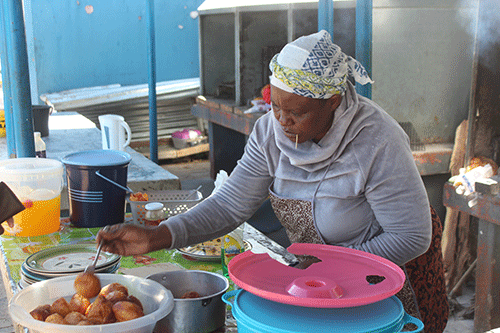Escalating prices of foodstuff, especially cooking oil, have squeezed informal vendors, who eke out a living on the popular street food, vetkoek.
During the third quarter of 2022, the annual food inflation increased at a faster rate than the all-item inflation, recording 8.9%, compared to the 5.7% registered in Q3 of 2021.
Average prices for oil and fats, fruits, bread and cereals for Q3 of 2022 registered the highest inflation of 26%, 21.6% and 9.8%, respectively, whereas meat prices recorded the lowest inflation of 5% during the quarter under review.
Looking at oils and fats, its inflation rate went up by 26% in the quarter under review, compared to 17.7% recorded in Q3 of 2021. The rise in the prices of this food item was driven by cooking oil (36.5%) and cooking fats (20.3%).
Inflation of peanut butter was the lowest, registering a marginal increase of 0.4% during the quarter under review.
These figures were released by the Namibia Statistics Agency (NSA) in December 2022. The astronomical increase in prices for household oils and fats took a toll on informal traders, especially those in the vetkoek business.
Yesterday, a vendor at the Soweto Market in Katutura, Almencia Kahengava, who has been in business for 23 years, said it is getting extremely difficult to feed low-income workers and students, as profits in the vetkoek business have all but dried up.
Vetkoek, a sweet dough fried in hot oil, can be enjoyed any time of the day with meat, relish or on its own. It is easy to make, and it is enjoyed by people from all walks of life.
“Since we have been in business, this is the toughest time of all. Oil and maize meal prices are really not justified. One at times just want to sleep at home and rest, but the hunger pushes us to come try,” said Kahengava.
She added customers complain when they increase prices or reduce vetkoek sizes, so they have no choice: “There’s no profit!”
When New Era visited the market last year, the traders said cooking oil prices have become scary. They said the increase has done nothing but drain their businesses, as they make no profit, making their lives miserable.
The 40-year-old Alvina Joseph, who sells vetkoek at the market, then lamented the escalating oil price has made it extremely difficult to make a profit.
“Yoh! The moment I see the price, I just want to run away and leave everything. How can the price jump like that? We rarely make a profit now. If I increase the price, no one buys, and I end up making losses. I just have to go with the flow,” narrated Joseph, who has been trading at Soweto Market for 13 years.
Agriculture sector
Agriculture, forestry and fishing sector continues to play an important role in the economy. Export earnings for agriculture, forestry and fishing products amounted to N$3.7 billion for Q3 of 2022; hence, its contribution to foreign currency earnings cannot be trivialised.
The NSA stated the import bill for the same quarter stood at N$1.3 billion, resulting in the sector recording a surplus of N$2.4 billion during the period under review.
Trade surplus is the amount by which the value of a country’s exports exceeds the cost of its imports.
The agriculture sector is the backbone of the Namibian economy, and the sector has over the years been one of the main drivers contributing to the national economy significantly.
The sector continued to be the main engine of the economy due to its nature of creating sources of income, supporting the livelihoods of the majority of its people, food security, foreign earnings and provision of raw materials to the manufacturing sector.
According to Alex Shimuafeni, NSA statistician general, value added for agriculture, forestry and fishing sector for the Q3 of 2022 was estimated at N$3.2 billion in nominal terms (6.4% of GDP).
In real terms, the sector declined to 8.8%, which is attributed to a decline in subsectors of livestock farming and fishing that decelerated by 18.9% and 3.1% in real value added, respectively.
Furthermore, the third quarter agriculture bulletin from NSA said the sector faced difficult challenges most especially from the pressure of market distortions resulting from the Covid-19 pandemic.
“The Covid-19 restrictions have exposed the sector to value chain disruptions, particularly caused by transportation, as both the business and consumers are negatively affected by high global energy demands that have been causing fuel, oil and energy prices to increase across the globe. Such disruptions have exacerbated the vulnerability of the sector, especially in terms of price volatility,” reads the report.
The agriculture sector continues to experience high costs of production.
NSA added the high factor costs were mainly reflected in fuel prices that rose by 49%, feed by 32.5% and animal health by 13.9% in Q3 of 2021. The international trade of live animals was interrupted by a moratorium on export and import.
According to the Namibia Agriculture Union, there was a delay in the marketing of live animals due to the closure of the South African border for 21 days from 18 August 2022. Likewise, there was a ban on imports from Botswana during the quarter review.
Looking at the sector’s economic performance, the sector performed far worse off below the overall economy during the quarter under review.
The deterioration observed in the sector was mainly due to the agriculture and fishing subsectors that registered declines of 14.2% and 3.1% in Q3 of 2022 downward from 10.8% and 1.6% posted in Q3 of 2021, respectively. Forestry recorded a slow growth of 8.2% when compared to 22.3% in Q3 of 2021.
– mndjavera@nepc.com.na


